Blog
Archive for the ‘how to detect cancer early’ Category
2021 Virtual PHIND Symposium
April 13, 2021
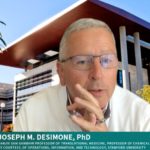
Dr. DeSimone gestures wearing an Oura monitoring ring, which made the news recently as the company partnered with the National Basketball Association (NBA) to help monitor the health of players.
The 2021 Precision Health and Integrated Diagnostics (PHIND) Center at Stanford held the virtual PHIND Symposium on March 23, 2021. The event showcased the exciting PHIND work that is going on campus-wide, featuring current PHIND investigators and Precision Health experts. Professor of Radiology Dr. Garry Gold gave an update on the PHIND center, reflecting upon former Radiology Chair Dr. Sanjiv Sam Gambhir’s visionary leadership and the continuation of this work, now with Dr. Gold’s direction, aimed at monitoring health to identify early transitions from health to disease.
Discussions included one with Dr. Joseph DeSimone, recently named recipient of the Sanjiv Sam Gambhir Professorship in Translational Medicine, who stated that although he is new to PHiND, his group has been thinking about precision delivery, using new devices such as microneedles to deliver treatments locally, rather than systemically throughout the body. Dr. Utkan Demirci, leading the Canary Center at Stanford, discussed his group’s Exosome-Total-Isolation-Chip (ExoTIC) device for identification of exosome-based biomarkers for monitoring health from a variety of biological fluids.
Besides devices, like the one in the picture, there was a focus on data. What kinds of data are we capturing as the clinical enterprise has transformed through Covid and telehealth? Can we separate patients into cohorts with online and in person visits to optimize the clinical workflows? How can we access and mine data from non-identifiable electronic health records? Participants also discussed ways to ensure equity in access to these devices and data, as well as ways to ensure clinical trial participants are engaged in meaningful ways in monitoring their health.
The Precision Health and Integrated Diagnostics Center (PHIND) at Stanford is dedicated to longitudinal monitoring and improvement of overall human health on a lifelong basis. Stanford advancements in biology and technology are leading to the potential to understand disease risk, detect disease early and enable preventative interventions.
Click Here to watch the videos from the Symposium.
Canary Foundation’s Ovarian Cancer Initiative: moving forward with matching specimen and imaging tissue in 3D
March 8, 2021

The Canary High Grade Serous Ovarian Cancer (HGSC) study is leveraging the expertise and resources of four institutions to study the microenvironmental factors that can lead fallopian tubes to develop this deadly type of ovarian cancer and thus provide a signal to alert for the presence of early disease. The Fred Hutchinson Cancer Research Center in Seattle, the University of Pennsylvania, the Van Andel Institute in Michigan, and the University of California San Francisco have built the infrastructure to share fallopian tube specimens, experimental and clinical data, and analytical teams.
The small pilot study goals are to ask whether it is possible to compare women carrying the BRCA mutations (who are at higher risk of developing ovarian cancer) compared to those who do not carry the mutation and determine whether it is possible to find a measurable difference in the microenvironment.
Based on their first results, the team is selecting a larger set of specimens, matched for clinical factors and BRCA mutation status, and will conduct RNA, DNA and methylome sequencing. The group is also comparing competing platforms for imaging the tissue expression in 3D so that differences along the length of the tube can be evaluated and tested for correlations with the genetic data.
Canary’s International Collaboration – ACED
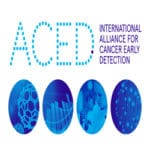
The International Alliance for Cancer Early Detection (ACED) joins researchers from the United States and the United Kingdom in a $70 million partnership. Founded in 2019, ACED is a partnership with the Canary Center at Stanford University, CRUK, the University of Cambridge, the Knight Cancer Institute at Oregon Health and Science University (OHSU), University College London and the University of Manchester. The following is one study chosen for it’s innovative approach to early detection:
Stratifying Risk for Early Detection in Hereditary Breast and Ovarian cancer
Project Award, led by: Marc Tischkowitz, University of Cambridge; Allison Kurian, Canary Center at Stanford for Cancer Early Detection; and Gareth Evans, University of Manchester. Stanford Team: Allison Kurian, Alice Fan, James Ford
CanRisk is a cancer risk assessment tool which combines genetic, lifestyle, clinical and imaging data to calculate an individual risk estimate for women with high-risk mutations in BRCA1 and BRCA2. The ability to provide personalized cancer risk estimates will identify women at particularly high risk. Currently, the ranges of cancer risk estimates for women with hereditary mutations in breast cancer genes are wide and not personalized, so all women are given the same figures. Creating a customized approach can solve this problem.
By implementing personalized risk estimates, early detection strategies can be tailored for the individual, therefore identifying those at the highest risk. Once feasibility is assessed, women undergoing predictive testing for BRCA1, BRCA2, PALB2, ATM or CHEK2 in US and UK genetics centers will be randomized to conventional vs personalized risk estimate based on genetic/lifestyle/hormonal modifiers.
Canary Foundation Welcomes Dr. Joseph DeSimone
November 22, 2020
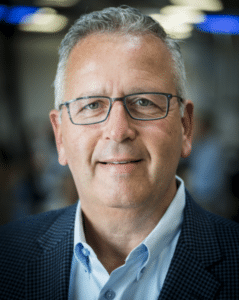
Dr. Joseph DeSimone
We welcome Professor Joseph M. DeSimone, PhD. in the position of the Sanjiv Sam Gambhir Professor in Translational Medicine. We are fortunate to have such creative and capable leadership as our work together in cancer early detection continues.
From the Stanford Press Release: The Stanford Department of Radiology is proud to announce Professor Joseph M. DeSimone as the inaugural Sanjiv Sam Gambhir Professor in Translational Medicine. A shining example of achievement, Joe has been described as “an igniter of innovation”. He has received international recognition as a scientist, inventor, and entrepreneur, earning major accolades including the U.S. Presidential Green Chemistry Challenge Award, the 2017 Heinz Award, and the Lemelson-MIT Prize. He is one of only 25 individuals elected to all three U.S. National Academies—the National Academy of Sciences, Medicine, and Engineering. In 2016, President Obama presented him with the National Medal of Technology and Innovation, the highest honor in the U.S. for achievement and leadership in advancing technological progress. Read more here.
Joe and his lab have made significant scientific breakthroughs in science and medicine including next-generation approaches to cancer treatment and diagnosis, implantable drug delivery devices, green chemistry, and most recently in 3D printing technology for medical devices tailored to an individual patient’s needs. A dedicated educator and strong advocate for bringing a broader diversity of perspectives into research, he has mentored over 80 students through PhD completion at Univ. of North Carolina and North Carolina State Univ. (his former 30-year career), half of whom were women and members of underrepresented groups in STEM.
As an avid researcher and innovator, Joe has authored over 370 scientific publications with over 42,000 citations to his work, and is a named inventor on over 200 issued patents. Additionally, he brings a unique ability to transfer novel solutions from his lab to the world through the companies he co-founded.
The Early Detection of Cancer Conference at Stanford!
October 9, 2019
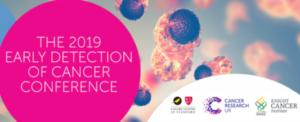 Canary Center at Stanford, Cancer Research UK, and the OHSU Knight Cancer Institute, hosted the Early Detection of Cancer Conference September 24 – 26 at the Frances C. Arrillaga Alumni Center, Stanford, California. Approximately 370 attendees, from 120 institutions, and 11 countries outside of the USA (including Australia, Canada, China, Finland, France, Great Britain, India, Netherlands, South Korea, Switzerland, and Ukraine) brought forth their latest findings and ideas. The annual Conference brings together experts in early detection from multiple disciplines to share ground breaking research and progress in the field.
Canary Center at Stanford, Cancer Research UK, and the OHSU Knight Cancer Institute, hosted the Early Detection of Cancer Conference September 24 – 26 at the Frances C. Arrillaga Alumni Center, Stanford, California. Approximately 370 attendees, from 120 institutions, and 11 countries outside of the USA (including Australia, Canada, China, Finland, France, Great Britain, India, Netherlands, South Korea, Switzerland, and Ukraine) brought forth their latest findings and ideas. The annual Conference brings together experts in early detection from multiple disciplines to share ground breaking research and progress in the field.
The conference is part of a long-term commitment to invest in early detection research, to understand the biology behind early stage cancers, find new detection and screening methods, and enhance uptake and accuracy of screening.
The talks ventured widely, from finding ways to extract more information from cell-free DNA in blood, to building cohorts of people at high risk of cancer to prospectively study the emergence of disease, to the role of the tumor micro-environment and the immune system in cancer early detection, and going beyond traditional risk factors to better select populations for targeted cancer screening.
Highlights of this year’s conference included: More »
Project Baseline aims to map human health
February 3, 2019
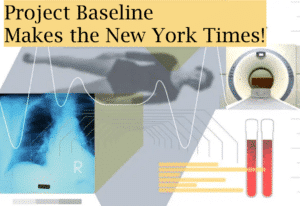 What if we could view changes in the body earlier than early to warn of possible disease? That is the aim of Project Baseline, to map human health. The New York Times published “Project Baseline Aims to Ward Off Illness Before We Get Sick” by Anahad O’Connor (Oct 2018). The study is recruiting 10,000 adults. And each will be examined and followed for at least four years. So the goal is to discover the earliest warning signs of cancer, heart disease and other killers. Participants, the first of whom was enrolled in 2017, are called Baseline Explorers.
What if we could view changes in the body earlier than early to warn of possible disease? That is the aim of Project Baseline, to map human health. The New York Times published “Project Baseline Aims to Ward Off Illness Before We Get Sick” by Anahad O’Connor (Oct 2018). The study is recruiting 10,000 adults. And each will be examined and followed for at least four years. So the goal is to discover the earliest warning signs of cancer, heart disease and other killers. Participants, the first of whom was enrolled in 2017, are called Baseline Explorers.
Project Baseline is the result of conversations in 2013, led by Google X’s Andrew Conrad. He consulted with Dr. Sam Gambhir, MD, chair of Radiology at Stanford University and director of the Canary Center for Cancer Early Detection. And also with Robert M. Califf, MD, professor of Cardiology in the School of Medicine, Duke University.
Conrad (now CEO of Verily, a spin out of Google X) was interested in exploring with these two notable healthcare thought leaders, one in cancer and the other in cardiology, about how to create what has become a landmark study. Both had deep experience in working with large patient cohorts and focus on early detection of disease. The project has formed teams across the country.
Seeking to create a baseline of health
Traditional trials focus on those who have a disease. So Project Baseline, as the name implies, mainly enrolls healthy individuals gathering enormous amounts of information. Baseline equips enrollees with wearable technology from Verily that tracks sleep patterns, heart rhythms and physical activity. The team is developing tools and technologies to collect, organize, analyze and curate the data.
And investigators are determining the best ways to share data with participants that is helpful to them. They are looking at how they can engage with their medical professionals.
Canary Foundation and the Canary Center at Stanford for Cancer Early Detection
Dr. Gambhir has served as Canary Foundation’s scientific director for more than a decade. He led the development of the Canary Center at Stanford for Cancer Early Detection. The Canary Center is a partnership forged in 2008 between Stanford University and Canary Foundation under the leadership of Don Listwin, based on the foundation’s mission. And interesting to know, Canary Center is the first program Stanford has focused entirely on cancer early detection.
American Cancer Society Report January 2019 is hopeful. Yet it motivates us to work harder at finding better tests
January 16, 2019
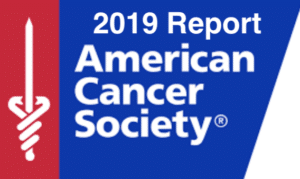
The new American Cancer Society report shows us that cancer deaths have dropped by 27% since their peak in 1991. The decrease is attributed to early detection, better treatments and a reduction in smoking rates. The ACS report also points to a socio-economic disparity in the numbers, based on broad county and area reports collected by Surveillance, Epidemiology, and End Results (SEER – a National Cancer Institute source of epidemiologic information on the incidence and survival rates of cancer in the United States, where access to education and healthcare remains a problem. Additionally, lower incidence has been slower in cancers such as lung and prostate. Also, rates of new cases rose for pancreatic and other cancers. While the overall decline in rates is great news, we must keep up the momentum to create early detection tests to save lives as cancer remains the second cause of death in the United States (22% in 2016), and a major health issue worldwide.
The report states that in 2019, 1,762,450 new cancer cases and 606,880 cancer deaths are projected to occur in the United States. From the report: “…the Lifetime probability of being diagnosed with invasive cancer is 39.3 % for men and 37.7% for women. Prostate, lung and colorectal cancers (CRCs) account for 42% of all cases in men, with prostate cancer alone accounting for nearly 1 in 5 new diagnoses. For women, the 3 most common cancers are breast, lung, and colorectum, which collectively represent one-half of all new diagnoses; breast cancer alone accounts for 30% of all new cancer diagnoses in women. The reasons for the excess overall risk in men are not fully understood, but partly reflect differences in environmental exposures, endogenous hormones, and probably complex interactions between these influences.”
Canary Foundation has been on the forefront of stimulating the field of cancer early detection globally by demonstrating cancer early detection tests as well as hosting scientific symposiums, mentoring researchers choosing the early detection path, and forging important national and international partnerships. To address access problems, Canary’s investments have focused, when possible, on cost-effective tests as a path to bridging the socio-economic disparities. Examples can be found in are our funded studies in enhance ultrasound using microbubbles, where ultrasound is found in doctor’s offices worldwide, representing an imaging modality in development useful for multiple cancers that is low-cost, non- invasive and with the additional benefit of not using radiation.
Canary funds four collaborative studies that pair faculty at Stanford with faculty at the University of Cambridge
February 15, 2018

Cancer early detection researchers develop future collaborations on a punting excursion in Cambridge, UK in September 2017.
Canary Foundation was ahead of the cancer early detection wave when it started in 2004. Since then, academic institutions, such as the University of Cambridge in the UK and the University of Calgary in Canada, have looked to Canary for advice as they build out their own cancer early detection programs.
This year, one such collaboration is taking shape in dynamic ways. Canary’s partnership with the University of Cambridge has resulted in four promising studies that partner researchers from Cambridge with researchers from Stanford. These projects, jointly funded by Canary Foundation and the Cancer Research UK Cambridge Centre, will explore innovative ways to detect prostate, lung, esophageal and renal cancers at an early stage.
In order to receive seed grants for these projects, applications had to include faculty at both Stanford and Cambridge. By fostering this transatlantic collaboration, Canary hopes to bring outstanding academic and clinical researchers from the US and UK together to tackle some of the most challenging questions in detecting cancer sooner.
The awards were announced at Cambridge’s third annual early detection symposium on January 15. You can read more about these collaborations below or by watching the video.
“A multi-modal approach to discover novel blood-based biomarkers for early detection of poor prognosis prostate cancer”
Tanya Stoyanova, an assistant professor of radiology at the Canary Center, is partnering with Vincent Gnanpragasam, an urologist at Cambridge University Hospitals, to identify different types of tumors in men with prostate cancer. The goal is to distinguish between aggressive tumors that would require immediate treatment, and slow-growing tumors that may not need treatment immediately but could be monitored closely so that any changes in the tumor can be picked up and acted upon. Their project will use data from a number of sources including tumor DNA found circulating in the blood, protein molecules found in cancer cells, and MRI imaging of the tumor.
“Early cancer detection through transcriptomic analysis of host immune cells”
Tom Soh, a professor of radiology at the Canary Center, is exploring new ways to detect early-stage lung cancer through his partnership with Robert Rintoul, a thoracic consultant at Cambridge University Hospitals. The pair is studying the immune cells in blood samples to see if there are particular signals that could be used to identify lung cancer early.
“Levitating a sponge for the early detection of Esophageal Adenocarcinoma”
Utkan Demirci, a professor of radiology at the Canary Center, is working with Rebecca Fitzgerald, Cambridge’s early detection program co-lead, to detect early signs of esophageal cancer. They will use a new nanotechnology developed by Demirci that separates different types of cells using a magnetic field. The technology will be applied to the mixture of cells collected from patients that are given a Cytosponge test developed by Fitzgerald that can diagnose Barrett’s esophagus – a common condition that, in some cases, develops into esophageal cancer.
“Early detection of renal cell carcinoma using DNA methylation markers in urine”
Olivier Gevaert, an assistant professor of medicine and of biomedical data science at Stanford, and John Leppert, an associate professor of urology at Stanford, are teaming up with Charlie Massie, a group leader in Cambridge’s early detection program. They will study whether it is possible to detect the early stages of a type of kidney cancer (Renal Cell Carcinoma) using biomarkers found in urine. Their research will look at specific signals in the DNA cells called methylation.
Our Newest Faculty Member Arrives from Harvard: Dr. Utkan Demirci – A Microfluidic Technology Platform
March 6, 2014
To implement new discoveries in the clinic, we are committed to developing novel micro- and nanoscale bioengineering and biomedical microfluidic technology platforms to enable clinical diagnostics and point-of-care tests. To achieve this goal, we have recently recruited Dr. Utkan Demirci from Harvard Medical School to lead our technology development efforts. Dr. Demirci’s previous efforts have yielded a point-of-care microchip technology to detect ovarian cancer biomarkers (e.g., HE4) using a 10-minute microchip assay and a cell phone as the detector.

Dr. Demirci will continue to innovate around point-of-care diagnostics, microfluidics assays and the development of technology platforms at the convergence of engineering, biology and materials science. Dr. Demirci brings his 15-person lab from Harvard this spring.
Further details of his research can be found here. The movie below, from BAMM Labs (Bio Acoustic Mems in Medicine) gives the general idea of his point-of-care diagnostic technology although it’s for a different medical application.
Registration Open for Canary Challenge 2014 in Honor of World Cancer Day
February 4, 2014
In honor of World Cancer Day, we are officially opening registration for the Canary Challenge 2014. Register for the ride now for $25 until March 31.
World Cancer Day is a chance to raise our collective voices in the name of improving general knowledge around cancer and dismissing misconceptions about the disease. For Canary, we’re emphasizing the need for more cancer early detection research, awareness, and advocacy. A great way to get involved is by participating in the Canary Challenge 2014.
This amazing one-day cycling event is about to get bigger and better than ever. The event will be hosted at HP’s campus in Palo Alto on Hanover St. We’re aiming high this year with a goal of raising $1.5 million, recruiting 150 teams and over 1,500 riders. This year’s ride will benefit the Canary Center at Stanford, supporting the researchers, scientists and doctors who are dedicated to cancer early detection. Register now and be part of the pioneering edge of cancer early detection research!
